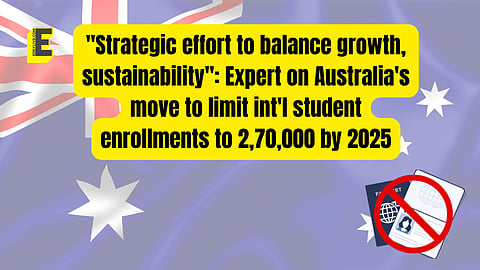"Strategic effort to balance growth, sustainability": Expert on Australia's move to limit int'l student enrollments to 2,70,000 by 2025
What are the primary reasons behind Australia's decision to limit international student numbers to 2,70,000?
Australia's decision to cap international student enrollments at 2,70,000 from 2025 appears to be a strategic effort to balance growth with sustainability.
This measure likely aims to manage the pressure on housing and public services while preserving the high standards of education that the country is known for.
By regulating the number of international students, Australia can better address infrastructure and accommodation needs, enhancing the overall student experience and benefiting both the international student and local community from a well-managed and high-quality educational environment.
How is the enrollment cap expected to impact prospective international students, particularly those from India considering Australia as a study destination?
Australia has long been a favoured destination for Indian students, with enrollments reaching 1,20,000 in 2023. The introduction of an enrollment cap reflects Australia’s commitment to maintaining high educational standards and ensuring that international students receive a more personalised and enriching experience.
While this cap may increase competition, it also emphasises the value of a well-rounded application, encouraging students to present their strengths and academic aspirations effectively.
This focus on quality will likely result in a more tailored and supportive learning environment for those who secure a place.
Additionally, the evolving landscape might prompt Indian students to consider other emerging study destinations such as New Zealand, Ireland, Germany, France, Italy, Malta, Singapore, and Dubai. These countries offer robust education infrastructure, streamlined visa processes, ample post-study work opportunities, and a more affordable cost of living, making them attractive alternatives for students seeking quality international education
Could the cap on enrollments shift the focus of international students, especially Indian students, towards other emerging study destinations such as New Zealand?
The cap on international student enrolments in Australia might lead some students to consider alternative destinations. The proposed caps include limiting enrollments at public universities to 1,45,000, aligning with 2023 levels, while private institutions and non-university providers can accept 30,000 students.
Additionally, vocational education and training institutions will see a cap of 95,000 new international students.
However, there is no need for be overly concern about this shift. While some students may explore other study destinations such as New Zealand, France, or Germany, we believe that their final decision will be based on thorough research and alignment with their academic goals and aspirations.
The decision to study abroad is influenced by a variety of factors, including the quality of education, course offerings, and long-term career prospects, which continue to make Australia a highly attractive option for many, including Indian students.


